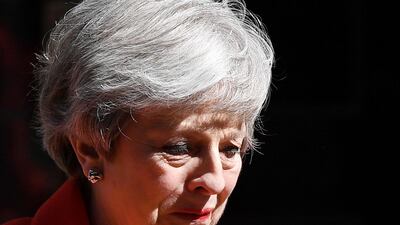On Friday afternoon, Prime Minister Theresa May gave a tearful speech outside 10 Downing Street, pledging to step down as leader of the UK's Conservative government. The scene had long seemed inevitable. Mrs May's three-year tenure has been dominated by Brexit, yet it has not resulted in a workable deal for the UK's departure from the European Union. In 2017, she presided over a snap election that obliterated her own majority. In order to stay in power, she then forged a compromised alliance with the hardline Northern Ireland-based Democratic Unionist Party. Throughout, she promised "strong and stable leadership", yet she has not delivered it. From her failure to achieve a cross-party consensus on Brexit to her handling of the Grenfell Tower disaster, she has come to be viewed as an awkward and aloof leader, lacking in personality and warmth. Some are even describing her as the worst leader in British history.
However, it should be remembered that Mrs May is not the architect of the UK's woes. Brexit was an inherited problem. In 2016, the former prime minister David Cameron held an unnecessary and ill-thought-out referendum in order to silence Eurosceptic Conservatives. Grossly misreading the national mood, he did so on the assumption that the British public would vote overwhelmingly to remain in the EU. Proved wrong, he resigned, triggering a leadership contest. The field of contenders contained many of those now jockeying to replace Mrs May, including hardline leavers such as Michael Gove, Boris Johnson and Andrea Leadsom. Regardless of her shortcomings, Mrs May fought for the position of prime minister out of a sense of duty. Despite having campaigned to remain in the EU, she wanted to give the British people what they voted for, maintain a close relationship with Europe and inflict as little damage on the nation's economy as possible.
Accordingly, Mrs May battled for a Brexit deal that Brussels and British MPs would accept, extending the deadline for the UK's departure – to no avail. Now, in the UK, Nigel Farage's Brexit Party is set to triumph at the European polls and the opposition Labour party is calling for yet another general election. Meanwhile, MPs, commentators and members of the public are demanding a second referendum, with the option to reverse Brexit. The EU, on the other hand, has grown weary and is pushing the UK to leave, with or without a deal, by the renegotiated October cut-off point. The UAE enjoys longstanding, close relationships with both the UK and the European Union. These links will endure. The past three years have, however, had a destabilising effect on the political and economic lives of millions of people in the UK and beyond. It is clear that whoever succeeds Mrs May faces colossal responsibilities. The first of them should be to put ideology and dogma aside, and act in their best interests.

